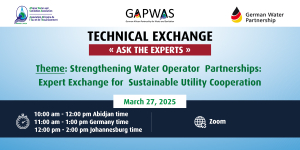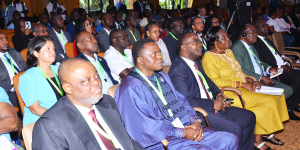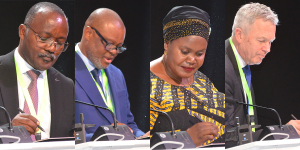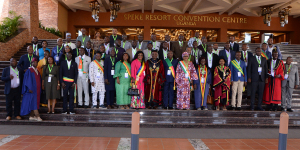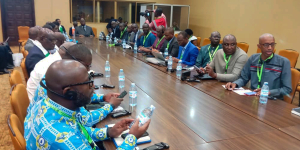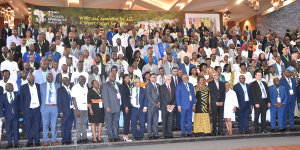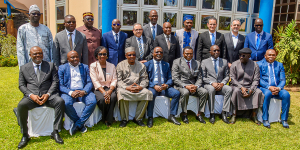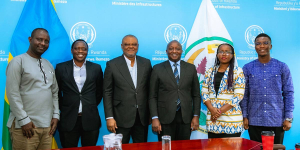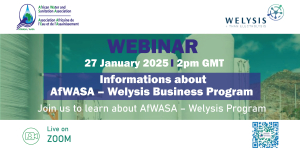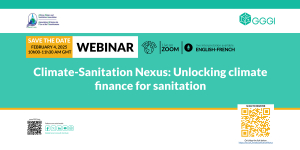Nzickonan Stéphanie
join our webinar on strengthening partnerships between water operators
The 11th edition of the “Ask the experts” series the German African Exchange of Expertise in the Field of Water and Sanitation will be organized on the topic: Strengthening Water Operator Partnerships: Expert Exchange for Sustainable Utility Cooperation.
There is a pressing need for sustainable water and sanitation services in Africa and beyond. Effective collaboration between water operators is essential to addressing common challenges such as infrastructure deficits, resource management, and access to clean water. By fostering partnerships, utilities can share best practices, innovative solutions, and technical expertise, leading to more efficient and resilient water systems. This topic reflects the growing recognition that international and regional cooperation is key to achieving the Sustainable Development Goals, particularly SDG 6: Clean Water and Sanitation for All.
This event creates a valuable platform for dialogue between German and African experts, combining diverse perspectives to address real-world challenges faced by water utilities. By drawing on insights from both regions, the workshop aims to empower participants with actionable strategies and tools to improve service delivery, strengthen institutional capacity, and promote long-term sustainability in the water sector. This cross-cultural exchange is a testament to the shared commitment of AfWASA and GWP to enhancing global cooperation for better water and sanitation outcomes.
Join the discussion! Click on the link to register https://us06web.zoom.us/meeting/register/WR--gCNJScuTDw40HYMjEA
22nd AfWASA International Congress and Exhibition: Outcomes and Declaration
The 22nd AfWASA International Congress and Exhibition came to a close on February 20, 2025 in Kampala, with major commitments aimed at strengthening the resilience of Africa's water and sanitation sector. The event brought together 2,200 participants from 67 countries, with the participation of 116 exhibiting companies and 28 sponsors.
The congress program included 4 high-level dialogues, 58 sessions and 300 presentations covering various aspects of the water and sanitation sector. Discussions focused on six priority tracks, resulting in the following resolutions presented at the closing ceremony by Dr Rosse Kaggwa, Chair of the Congress Program Committee:
CLIMATE CHANGE AND INTEGRATED WATER RESOURCE MANAGEMENT
Effectively incorporate climate change resilient options into the design development and operation of water and sanitation infrastructure
Promote equitable and sustainable use of water resources
Scale environment and catchment protection and restoration interventions
WATER MANAGEMENT
Strengthen utility management across all segments, including urban, rural poor and other vulnerable communities
Adopt innovative and appropriate management frameworks to maintain high functionality and improve the sustainability of water supply schemes and systems
And under Amcow, we are committed to the post Africa water vision for 2025 and to the achievement of agenda 2063
SANITATION MANAGEMENT
Accelerate sanitation access and coverage through innovative financing mechanisms, appropriate technology adoption and complementary partnerships and collaborations
Strengthen sanitation information management to support planning resource mobilization management and accountability for sanitation service delivery
And lastly, scale fecal sludge treatment facilities in view of the significant non-sewage sanitation segment
CAPACITY DEVELOPMENT, COMMUNICATION AND PARTNERSHIPS
The newly established African water and sanitation Academy here in Uganda, should ensure relevant equitable and cost-effective capacity building programs for the member and partnering utilities
Strengthen the existing partnerships and collaborations and promote well-designed new partnerships and collaborations so as to maximize impact in relation to utility performance, service delivery, an increased service coverage
GOVERNANCE AND FINANCING
Improve utility performance and operational efficiency as one of the measures to reduce the financing gaps
Take advantage and make use of the financing products offered by financiers and development Partners
Explore financing through borrowing from the domestic financial markets in view of the advantages related to this option. And in that, we’re trying to move our way from dependency on donor funding
Effectively engaged stakeholders, so to have more enabling regulatory environments to support implementation of better cost-effective if cost-efficient reflective tariffs
Walk towards and maybe we had run towards reduction independence on aid
Work towards establishing and maintaining adaptive, accountable and transformational leadership in all utilities and the water and sanitation sector at large
RESEARCH TECHNOLOGY AN INNOVATION
Commit investments into research and innovation
Embrace digital transformations in the utility processes based on the actual utility needs and sector needs. And adopt, “A do it yourself policy”
The 22nd AfWASA International Congress and Exhibition ended on a note of hope and determination, with the aim of making water and sanitation an effective right for all in Africa. AfWASA and its partners are committed to implementing these resolutions by fostering ongoing dialogue between governments, operators, financial partners and civil society. They look forward to meeting again in February 2026, at the 23rd Congress, to be held in Yaoundé, Cameroon, to assess progress and further develop strategies to ensure universal access to safe drinking water and sanitation.
22nd AfWASA International Congress and Exhibition: Third Deputy Prime Minister Rukia Nakadama launches the African Water and Sanitation Academy
The African Water and Sanitation Academy (AWASA) was officially launched on February 16, 2025, during the 22nd African Water and Sanitation Association (AfWASA) Congress and Exhibition held at Speke Resort Munyonyo in Kampala, Uganda. This significant event marked a milestone in Africa's commitment to enhancing water and sanitation services across the continent.
AWASA, headquartered at the National Water and Sewerage Corporation's (NWSC) International Resource Centre in Bugolobi, Kampala, aims to serve as a center of excellence. Its primary mission is to build the capacity of managers and decision-makers in the water and sanitation sector throughout Africa. The academy focuses on leadership development and change management, integrating scientific, technical, and governance aspects to address the continent's unique challenges in this sector.
The establishment of AWASA is a collaborative effort between the Government of Uganda and AfWASA. In September 2024, Uganda's Minister of Foreign Affairs, Gen. Abubakar Jeje Odongo, and AfWASA President, Eng. Dr. Silver Mugisha, signed a host country agreement to formalize Uganda's role as the academy's host nation. This partnership underscores Uganda's dedication to improving water and sanitation services and highlights its strategic position in leading capacity-building initiatives on the continent.
During the launch, President Yoweri Museveni, represented by Third Deputy Prime Minister Rukia Nakadama, emphasized the critical role of AWASA in achieving Sustainable Development Goal 6, which aims to ensure the availability and sustainable management of water and sanitation for all. He highlighted the necessity for homegrown solutions, continuous research, and competence-based skills development to overcome the diverse challenges facing Africa's water and sanitation sector.
AWASA is poised to collaborate with regional centers across Africa, fostering innovation and sharing best practices to elevate the performance of water and sanitation utilities. By focusing on leadership and change management, the academy aspires to transform the sector, ensuring sustainable and equitable access to water and sanitation services for all Africans.
22nd AfWASA International Congress and Exhibition: the “One City, One Fecal Sludge Treatment Plant” Initiative Launched at Mayors' Forum
The “One City, One Fecal Sludge Treatment Plant” project is an ambitious initiative to equip every African commune with an infrastructure dedicated to the efficient treatment of fecal sludge. The project was officially launched on February 18, 2025 in Kampala, Uganda, at the Mayors' Forum held as part of the 22nd AfWASA International Congress and Exhibition.
The main aim of this initiative is to improve urban sanitation facilities in Africa, by ensuring that every city has the necessary means to treat faecal sludge in an efficient and environmentally-friendly way. This is intended to reduce the health risks associated with inadequate human waste management and promote a healthier environment for urban populations.
During the Forum, some thirty African mayors shared their experiences, and the initiatives already implemented in their respective communes. For example, the mayor of Kara 3 (Togo), Sami Essokudjowu PISSIYOU, spoke of the construction of a fecal sludge treatment plant in Kara, thanks to Togo's sanitation policy. For his part, the mayor of Kampala, Erias Lukwago, outlined a latrine construction project in the shanty towns of his municipality.
The experiences of other African cities, including Douala and Fokoué in Cameroon, Cotonou in Benin and Lilongwe in Malawi, were also highlighted.
The question of financing these sanitation projects was a central point of discussion.
The mayors called for local funding to be stepped up, while expressing their gratitude to international partners for their support. Ibra Sow, President of the Association Panafricaine des Acteurs de l'Assainissement (Pan-African Association of Sanitation Actors), the precursor of this initiative, stressed the importance of supporting mayors in setting up and managing fecal sludge treatment plants. He called for close collaboration between local authorities, national governments and international partners to tackle sanitation challenges and promote sustainable urban development.
The “One City, One Fecal Sludge Treatment Plant” initiative is a significant step forward in improving urban sanitation conditions in Africa.
22nd AfWASA International Congress: Côte d'Ivoire's Minister of Water and Forests calls for greater commitment from governments to ensure access to water and sanitation in Africa
At the 22ᵉ International Congress and Exhibition of the African Water and Sanitation Association (AfWASA), held in Kampala from February 16 to 20, 2025, Côte d'Ivoire's Minister of Water and Forests, Laurent Tchagba, highlighted the advances and challenges related to water and sanitation management on the continent.
He recalled that the 21ᵉ edition of the Congress, organized in 2023 in Abidjan, had led to the adoption of the Abidjan Declaration. This committed the international community to three major axes: recognizing access to water and sanitation as a fundamental right, guaranteeing the availability of water resources in quantity and quality, and establishing a sustainable financing mechanism for the sector.
Two years on, he gave an initial assessment of the implementation of these commitments in Côte d'Ivoire. According to him, an integrated strategy has been drawn up, encompassing the mobilization of water resources, access to drinking water and sanitation services. This strategy is currently being implemented with the support of the World Bank through the Water Security and Sanitation Support Program.
This program aims to improve water resource management, access to drinking water and sanitation services, and institutional strengthening. A financing platform is also being developed to ensure that projects are consistent with this global strategy.
At the same time, Côte d'Ivoire is committed to strengthening the monitoring and protection of water resources by setting up information systems covering all the country's watersheds. These will enable continuous monitoring of the quality and quantity of water resources. In addition, initiatives such as the drafting of a Master Plan for the Development and Management of Water Resources and the creation of a dedicated monitoring squad testify to the country's determination to better protect these resources.
With regard to cross-border cooperation, the Minister mentioned the establishment of management authorities for hydrological and hydrogeological basins, notably for the Niger and Volta rivers, as well as efforts underway for the Comoé-Bia-Tanoé and Mano River basins.
On the financial side, he announced the implementation of a platform dedicated to the implementation of the SDG-6 strategy, aimed at federating the sector's players around a common vision. This initiative should lead to the organization of a donor roundtable in 2025.
In conclusion, Laurent Tchagba emphasized that, despite the progress made, the efforts of Côte d'Ivoire and other African countries remained insufficient in the face of the sector's challenges. He therefore called for a strong political commitment from governments to integrate the Abidjan Declaration into their national development strategies.
Opening of the 22nd AfWASA Congress: the Executive Director Reaffirms the Association's Commitment to a Sustainable future
The opening ceremony of the 22nd Congress of the African Water and Sanitation Association was held this Sunday, February 16, 2025 at the Speke Resort Munyonyo in Kampala. The event was attended by Uganda's highest authorities, African ministers, development partners and numerous delegates from all over the world. On this occasion, the Executive Director of AfWASA, Olivier Gosso, recalled the importance of this meeting and presented the central role of the association in the governance and innovation of the sector.
He emphasized that AfWASA, founded in 1980 as the African Union for Water Suppliers, had evolved to adapt to the continent's challenges. Renamed the African Water and Sanitation Association, in 2004 at the Accra Congress, it took its current name in 2023 in Abidjan, thus affirming its commitment to placing sanitation at the heart of its priorities.
He said that with 45 years of expertise, AfWASA now operates in 43 African countries and works with international partners to strengthen governance, improve service quality and promote innovative solutions.
Over the past decade, the Association has mobilized more than $25 million from partners such as USAID, the Gates Foundation and other institutions to fund capacity building programs, reduce non-revenue water and improve sanitation management. It has also invested around $2 million in research grants to foster innovation in the sector.
Olivier Gosso took the opportunity to outline AfWASA's strategic ambitions for the next five years, including the creation of the African Water and Sanitation Academy, the establishment of an expert hub and the decentralization of operations centers with the opening of regional offices. He invited members and partners to pursue their commitment to building a sustainable future for the continent.
The opening ceremony was preceded by pre-conference events, namely the women's forum and the forum for young water and sanitation professionals.
AfWASA Annual General Meeting: new leadership for the pan-African Association
As a prelude to the 22nd International Congress and Exhibition which opens this February 16, 2025 in Kampala, Uganda, AfWASA held its Ordinary General Meeting preceded by a meeting of the Executive Committee. One of the items on the agenda was the renewal of the Association's governing bodies. As such, Dr. Ingénieur Silver Mugisha, President of the Association passed the baton to Dr. Blaise Moussa, Managing Director of the Cameroon Water Corporation (CAMWATER), who becomes the new President of the African Water and Sanitation Association for a two-year term.
Also noteworthy is the appointment of the new Chairman of the Strategic and Technological Council, Dr. Mahmood Lutaaya, Director of the Kampala Region of NWSC Uganda.
We will come back to this information later.
AfWASA and Rwanda: Towards Collaboration for Concrete Actions in the Water and Sanitation Sector
As a prelude to the official launch of phase II of EMPOWERWASH-AFRICA program, to be held in Kigali from January 29 to 30, a delegation from the African Water and Sanitation Association (AfWASA), comprising the Executive Director and Program Coordinator, was granted an audience with the Permanent Secretary of the Ministry of Infrastructure (MININFRA) of Rwanda. Also present at the meeting were the General Director of Water and Sanitation, the WATSAN Coordinator, and the Country Director of Water For People Rwanda.
Discussions focused on the collaboration between these institutions and AfWASA, the resumption of relationships between Rwanda and the Association, and the progress made in organizing the workshop.
The Rwandan government, through MININFRA, has expressed a keen interest in closer collaboration with AfWASA. This will be reflected in the signing of a partnership agreement to support initiatives in the water and sanitation sector.
This meeting marks an important step towards a solid and lasting partnership between Rwanda and AfWASA, testifying to their shared commitment to tackling the challenges of access to water and sanitation on the African continent.
AfWASA is Organising a Benchmarking visit at WELYSIS in Spain
Join us to learn about AfWASA – Welysis Program !
Click on the link below to register.
After registering, you will receive a confirmation e-mail with instructions on how to join the meeting.
https://us06web.zoom.us/meeting/register/nip4-wWDSa2mkhCp_xAYDA
Join our Webinar on Climate Financing
We are excited to announce that registration is open for our upcoming webinar on climate finance for sanitation.
This Webinar, co-organized by GGGI and AfWASA, will enhance the understanding of the relation between the sanitation sector and climate change and the efforts currently ongoing in Africa to address the interconnected challenges within this nexus. it will also explore available opportunities and challenges on climate finance for sanitation sector.
SAVE THE DATE!
? Tuesday February 4, 2025
⌚ 10:00-11:30 am GMT
The webinar will feature presentations, a panel discussion and experience sharing on climate-sanitation nexus, strategies and opportunities for climate finance for the sanitation sector as well as innovative solutions to address emissions from the sanitation sector and establish resilient sanitation systems.
Register today to be part of the conversation: https://us06web.zoom.us/webinar/register/WN_WVr7SBxURm62k79aKgY0EQ

 English
English  Français
Français 
